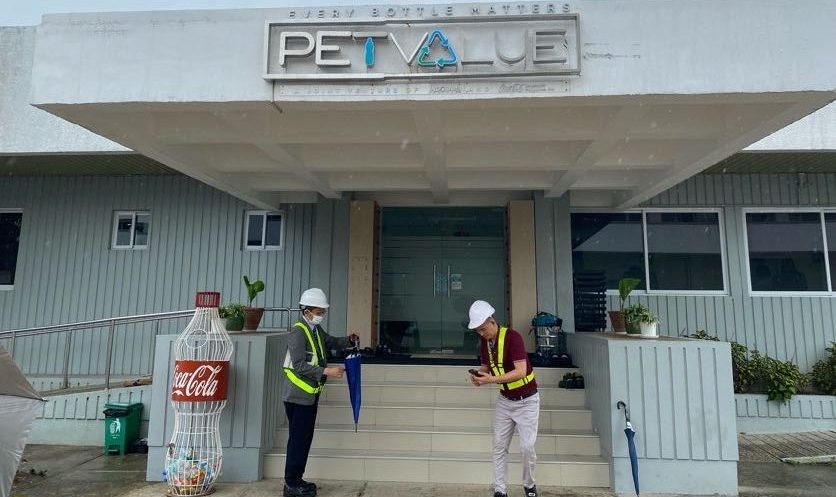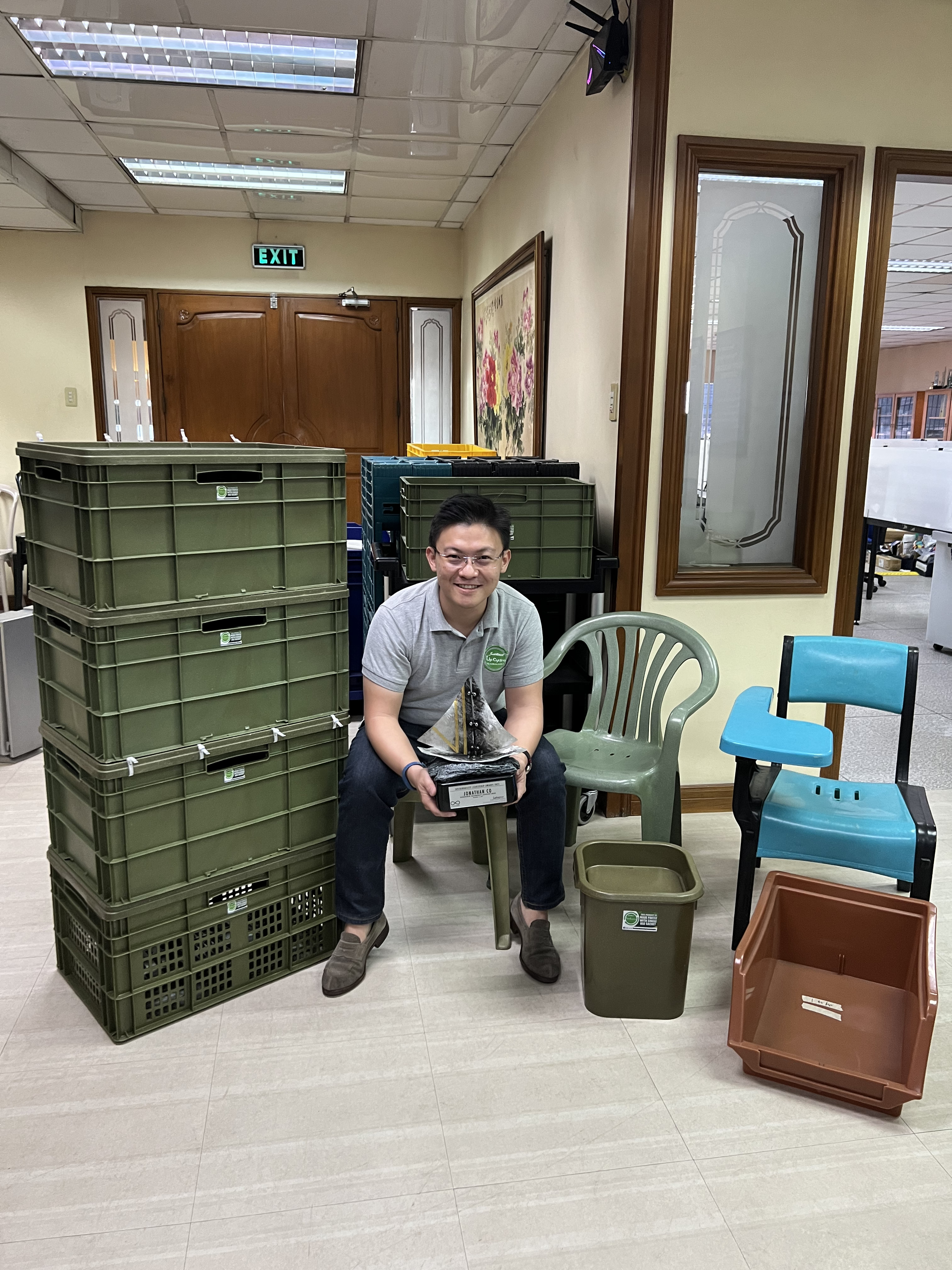

Manila, 13 April 2023: Row upon row of tall piles of PET bales sprawl across the PETValue Philippines plant in General Trias, Cavite Province, a two-hour drive south of Manila. The bales consist of PET (polyethylene terephthalate) plastic bottles from municipal curb side collection, sorted to remove undesirable materials, and baled for efficient transportation and handling.
Mr Joel Potian, PETValue Site Manager, told us that as of March, the company had collected 13,000 metric tons of PET bottles.
‘We are committed to recycle 2 billion used PET plastic bottles per annum, or equivalent to 30,000 metric tons of bottles, with an output of 16,000 metric tons a year of recycled PET resin,’ he said, during a site visit by the Regional Knowledge Centre for Marine Plastic Debris (the Centre).
‘As of today we have produced 5,500 metric tons already. We’re happy that last February, we had shipped commercially to customers, Coca Cola and Glades,’ added Mr Potian, who has nearly three decades of manufacturing and chemical engineering expertise in the Philippines and the Republic of Korea.
PETValue is the country’s first food-grade, bottle-to-bottle recycling facility, beginning operations in 2022, and is now the largest in the Philippines. It is a joint venture between Coca-Cola Beverages Philippines, Inc (CCBPI) – Coca-Cola's bottling arm in the country – and Indorama Ventures, a Thailand-headquartered global sustainable chemical company.
The partnership is in line with the Coca-Cola Company’s World Without Waste programme, which was launched in 2018 to collect and recycle the equivalent of every bottle it sells by 2030 and use at least 50% recycled content in its packaging by 2030.
PETValue will help ensure used PET plastic bottle packaging will be given new life and function as it is collected, processed, and used multiple times. The plant uses cutting-edge technology and industry-leading best practices to employ the safest and most advanced recycling process for plastic bottles made from PET materials.
The plant washes and shreds post-consumer bottles into flakes to produce recycled PET resin, which is suitable for use in food-contact applications.
‘We’re encouraging everyone to use these recycled PET bottles. We have been our FDA [Food and Drug Administration] and USFDA approved, no problem with food contact, this is proven technology,’ said Mr Potian.
‘The main driver to the circular economy is the collection. We’d like to encourage everyone to refer an aggregator to us, and by doing so you are participating in the circular economy. I hope the EPR [extended producer responsibility] Act could provide credits to these users of our PET. This way, we can really make the PET circular economy a reality,’ he said, referring to the 2022 Law which requires big companies to adapt and implement policies for the proper management of plastic packaging waste.
Also read: How to Prevent Plastic Leakage from Factories and Informal Recycling Sector in ASEAN
Manila, 13 April 2023: Row upon row of tall piles of PET bales sprawl across the PETValue Philippines plant in General Trias, Cavite Province, a two-hour drive south of Manila. The bales consist of PET (polyethylene terephthalate) plastic bottles from municipal curb side collection, sorted to remove undesirable materials, and baled for efficient transportation and handling.
Mr Joel Potian, PETValue Site Manager, told us that as of March, the company had collected 13,000 metric tons of PET bottles.
‘We are committed to recycle 2 billion used PET plastic bottles per annum, or equivalent to 30,000 metric tons of bottles, with an output of 16,000 metric tons a year of recycled PET resin,’ he said, during a site visit by the Regional Knowledge Centre for Marine Plastic Debris (the Centre).
‘As of today we have produced 5,500 metric tons already. We’re happy that last February, we had shipped commercially to customers, Coca Cola and Glades,’ added Mr Potian, who has nearly three decades of manufacturing and chemical engineering expertise in the Philippines and the Republic of Korea.
PETValue is the country’s first food-grade, bottle-to-bottle recycling facility, beginning operations in 2022, and is now the largest in the Philippines. It is a joint venture between Coca-Cola Beverages Philippines, Inc (CCBPI) – Coca-Cola's bottling arm in the country – and Indorama Ventures, a Thailand-headquartered global sustainable chemical company.
The partnership is in line with the Coca-Cola Company’s World Without Waste programme, which was launched in 2018 to collect and recycle the equivalent of every bottle it sells by 2030 and use at least 50% recycled content in its packaging by 2030.
PETValue will help ensure used PET plastic bottle packaging will be given new life and function as it is collected, processed, and used multiple times. The plant uses cutting-edge technology and industry-leading best practices to employ the safest and most advanced recycling process for plastic bottles made from PET materials.
The plant washes and shreds post-consumer bottles into flakes to produce recycled PET resin, which is suitable for use in food-contact applications.
‘We’re encouraging everyone to use these recycled PET bottles. We have been our FDA [Food and Drug Administration] and USFDA approved, no problem with food contact, this is proven technology,’ said Mr Potian.
‘The main driver to the circular economy is the collection. We’d like to encourage everyone to refer an aggregator to us, and by doing so you are participating in the circular economy. I hope the EPR [extended producer responsibility] Act could provide credits to these users of our PET. This way, we can really make the PET circular economy a reality,’ he said, referring to the 2022 Law which requires big companies to adapt and implement policies for the proper management of plastic packaging waste.
Also read: How to Prevent Plastic Leakage from Factories and Informal Recycling Sector in ASEAN

Research Associate


